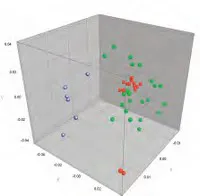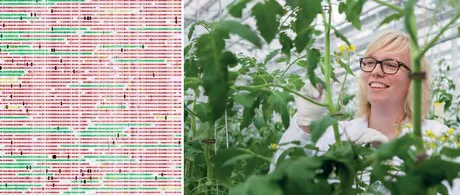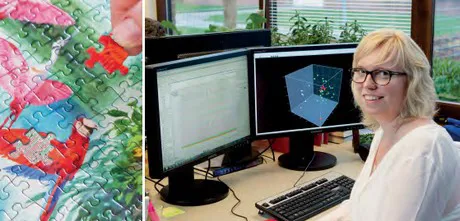 The University of Amsterdam (uvA) and Naktuinbouw are working hard to deploy a new DNA-technology to better and faster identify the relationships between plant material. The new DNA-technology is already developed for cucumber and tomato, other crops will follow.
The University of Amsterdam (uvA) and Naktuinbouw are working hard to deploy a new DNA-technology to better and faster identify the relationships between plant material. The new DNA-technology is already developed for cucumber and tomato, other crops will follow.New varieties differ less from each other. To identify the differences, the new DNA-technology is helpful. The existing methods for analysis are no longer adequate for tomorrow's problems and are too labor intensive.

Cooperation
The project Green Forensics started in 2013, as part of the Green Life Sciences Hub, better known as the CSI in the horticulture. The UvA and Naktuinbouw are cooperating in this. Knowledge in the area of the high throughput sequencing technology comes from the UvA. Naktuinbouw brings expertise in the field of varieties and relationship analyses. Naktuinbouw has access to different plant databases. It also functions as a bridge to make the technology transferable in areas of knowledge for the sector.
New technology
Researcher Fleur Gawehns-Bruning (Naktuinbouw Laboratories, team R&D) indicates that the new DNA-technology (high throughput sequencing) is bringing important benefits. It makes all sequence information of every variety available for a fast and good analysis. Genomes of plants are complex. Take the genome of a tulip which is ten times larger than that of a human. Therefore they need to spend more time and money to analyze its genome. There needs to be a baseline set, before the new technology can be implemented. For cucumber and tomato reference material is already available, so the new technology can be implemented for these crops. In this project rose, lettuce and tulip are included. The new identification methods are offering the horticultural entrepreneurs the chance to improve their position. It can provide evidence in cases of alleged infringement of plant breeders' rights

New impulse
Through this project ‘Green Forensics’ the determination of the possible relationship of plant material got an important impulse. When the project is finished in 2016 it will have a fresh start within Naktuinbouw Laboratories.
What is DNA-sequencing?
DNA-sequencing is the determination of the order in which the four nucleotides: adenine, guanine, cytosine and thymine (A, G, C and T) are arranged in a DNA-string. The current technology is able to completely unravel the whole genome in only a few days, through a combination of chemical- and computer techniques. The arrival of fast DNA-sequencing methods accelerates the biological and medical research. Knowledge of DNA-sequences has become an indispensable tool for fundamental biological research and applied science, such as diagnosis for medical a horticultural diagnosis, biotechnology, forensic biology, virology and biological classification.
What is a Variety Tracer?
Naktuinbouw Variety Tracer ascertains the identity of plant material. The technology combines morphological examination with genetic fingerprinting. Comparing a plant with a set of reference plants or varieties allows the establishing of suspected second cropping, infringement of Plant Breeders’ Rights or essential derived varieties. This product provides a concept which can be used to settle (legal) discussions about identity. There are also Tracers available for pathogens and an origin Tracer.
Source: Naktuinbouw
Binnenstebuiten
Postbus 40, 2370 AA Roelofarendsveen
Sotaweg 22, 2371 GD Roelofarendsveen
Tel. +31 (0)71 332 62 62
Fax +31 (0)71 332 63 63
E-mail: Naktuinbouw
